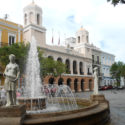Last month, Governor Alejandro Garcia Padilla accused the U.S. of lying about the relationship between Puerto Rico and the United States. As the Supreme Court examines cases that rely on the nuances of this relationship, it is even more important now to be clear on what it means to say that Puerto Rico is a “commonwealth.”
There is no moral content to the Governor’s ideologically shrill claim that the U.S. “lied to the international community” in 1953. At that time the “commonwealth” system of local constitutional government for a territory was the best the U.S. could do to empower local democracy, short of independence or statehood.
Just as it had authorized the Commonwealth of the Philippines to adopt a local constitution in 1934 under a territorial policy leading to independence, Congress allowed Puerto Rico to establish local self-government that could continue until Puerto Rico was ready to chose between independence and statehood. Paragraph 9 of U.N. Resolution 748, approving “commonwealth” as a decolonizing measure, expressly recognized that it was not a constitutionally permanent status, and that either party could initiate changes to the association through the applicable constitutional process.
The Governor needs to be more careful who he calls a liar, because in 1953 the U.S. circulated a legal memorandum about “commonwealth” to the U.N. (Appendix A to U.S. House of Representatives Report 105-131, Part 1). In paragraph 21 of that memo the U.S. informed the U.N. before the vote on Res. 748, ending U.S. reporting on the progress of the territory’s decolonization, that the legal nature of “commonwealth” was subject to the supremacy of the U.S. Constitution, federal laws and judicial interpretation by the federal courts.
Similarly, the federal law approving the local constitution (P.L. 82-447) recited the amendments Congress had required that prevented amendments inconsistent with the U.S. Constitution and federal law applicable to Puerto Rico. Luis Munoz Marin, Jose Trias Monge and other leaders understood exactly what was going on, and knew that “commonwealth” was legally ambiguous and ideologically aspirational.
Indeed, the Governor’s slanderous accusation against the U.S. is historical revisionism that ignores the reality that in 1953 the U.N. had not yet adopted a clear definition of decolonization status options. That would not come until years later with adoption of U.N. Res. 1541 in 1960 and U.N. Res. 2625 in 1970.
Under those declarations the U.N. would adopt criteria for decolonization through independence, integration or free association. In 1953, the same day it took Puerto Rico off the list of colonies, it first approved U.N. Res. 472 declaring general principles for decolonization. Even though “commonwealth” was not technically in compliance with all criteria set forth in Res. 472, because it met the test of approval by the voters in the territory the delisting of Puerto Rico was a diplomatic compromise supported by leaders from Puerto Rico as the best that could be accomplished at the time.
U.S. diplomatic rhetoric at the time was just that, and the heavily divided vote in the U.N. with nearly as many abstentions as “yes” votes left no doubt that the U.S. twisted arms to get Puerto Rico off the U.N. agenda, primarily because of Cold War foreign policy dynamics. The alternative was to let the Soviet Union and Cuba use the U.N. decolonization process to meddle in U.S. administration of Puerto Rico.
PR leaders understood the trade off and the deal and supported it. The only hoax has been the attempt to use the U.N. record as the basis for the myth that “commonwealth” is “free association,” even though “commonwealth” does not fulfill the U.N. legal definition of “free association.” Nor does “commonwealth” comply with the definition of “free association” that Congress adopted for the Trust Territory of the Pacific Islands based on U.N. Res. 2625.
In 1953 the new territorial constitution was as close to decolonization as the U.S. and Puerto Rico could get without taking the next step to either independence or statehood. In Congress and in the U.N. Luis Muñoz Marin told the world that Puerto Rico wanted to embrace this “commonwealth” experiment and see what could be achieved under it. Since then the U.S. government has said repeatedly that Puerto Rico will remain in its current status as a territory unless Congress exercises its plenary power to initiate and bring about a change of status.
The myth that “commonwealth” was a form of sovereign nationhood became something in the nature of a political cult for leaders in the territory and in Washington who opposed real nationhood or statehood. When a myth that is false becomes ideology — that is the lie. But in the Alice in Wonderland world the Governor lives in those in Washington and San Juan who are finally telling the truth in very clear terms are the “liars.”
Puerto Rico’s “commonwealth” has no legal meaning. Puerto Rico is a territory belonging to the United States, as is the “Commonwealth of the Northern Mariana Islands,” which has greater autonomy under its organic act labeled a “Covenant” than Puerto Rico has under a “compact” dating back to 1950 that is anachronistic and obsolete.
The commonwealth myth is obsolete. We must demand — from leaders in Puerto Rico and in Washington D.C. — action to resolve Puerto Rico’s status permanently.








No responses yet